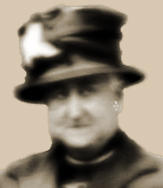Othello in Earnest
LADY BRABANTIO and OTHELLO , just after tea. They speak in the distinctive accents of, respectively, Lady Bracknell and John Worthing.
LADY BRABANTIO: Excellent cucumber sandwiches, Mr Othello.
OTHELLO: I'm so pleased you enjoyed them, Lady Brabantio.
LADY BRABANTIO: And now, to our business. You wish to marry my daughter Desdemona, I believe.
OTHELLO: Yes, Lady Brabantio, very much so.
LADY BRABANTIO: I see. In that case I have a few questions to put to you. (She takes out her notebook and pencil.) What is the source of your income?
OTHELLO: I am a soldier, Lady Brabantio - from an old military family.
LADY BRABANTIO: (taking notes) Ah.
OTHELLO: I am, I'm afraid, often out of Venice: slaughtering the infidel, sacking and burning towns, beheading prisoners.
LADY BRABANTIO: I am pleased to hear it. A man who remains at home can do incalculable harm. My husband Lord Brabantio is a case in point. The more domestic he becomes, the more savage his behaviour seems to be. And now, your property.
OTHELLO: Two main residences, Lady Brabantio. A bachelor flat near the Bridge of Sighs and a large Gothic mansion on the Rialto.
LADY BRABANTIO: That is most satisfactory. And were you born in one of the great houses on the Canal, or did you rise from the rural simplicity of a country seat?
OTHELLO: (reluctantly) I'm afraid I was born... elsewhere, Lady Brabantio.
LADY BRABANTIO: (surprised) Elsewhere, Mr Othello?
OTHELLO: Yes. (Evasively) Rather far away, in fact.
LADY BRABANTIO: (disapprovingly) Rather far away? And where, precisely, 'far away' were you born?
OTHELLO: In ... in Africa, Lady Brabantio.
LADY BRABANTIO: (Lady Bracknell-like) Africa?
OTHELLO: Yes. In a tiny village in Africa. Kajabufu. I was born in a small military fortification as it happens, a simple hut made of mud and dung; my nappy a banana-leaf, my rattle a quiver of poisoned arrows, my cradle a sandbag.
LADY BRABANTIO: (even more Lady Bracknell-like) A sandbag?
OTHELLO: Yes, Lady Brabantio. There in a clearing in the great jungle where the she-elephant suckles her young.
LADY BRABANTIO: (on a rising note of disapproval) And how, if I may ask, did you come to be raised on a sandbag in a hut in a clearing where the she-elephant suckles her young? It seems most improbable.
OTHELLO: My parents were Africans, Lady Brabantio - as am I.
LADY BRABANTIO: (appalled) Indeed? Not blackamoors?
OTHELLO: Quite. Father was a warrior-chief, Mother his favourite wife. (Shakespeareanly) Haply, for I am black...
LADY BRABANTIO: Not happily at all, Mr Othello. I had assumed, from your appearance, that you had recently been basking in the sun at one of our well-known seaside resorts. Indeed, this puts, if I may say so, an entirely new complexion on the matter. Yet, let us continue. I have almost completed my questions, and I always finish what I begin, especially if there is no reason to do so. That is the meaning of thoroughness.
She takes up her pencil.
Now, your education. Which of our great universities did you attend?
OTHELLO: None, I'm afraid. No formal education at all. My childhood was spent climbing the banyan tree, sporting naked in the sunshine, foraging for nuts and grubs with 'Maputu' the wart hog.
LADY BRABANTIO: (not impressed) I see. And as an adult?
OTHELLO: As a soldier I have had many remarkable adventures which Desdemona, dear girl, has often begged me to recount. I have known disasters as well: sold into slavery, shipwrecked on the Isle of Wight for several weeks, and I have been scalped - on two different occasions - by the dreaded Norijwanee tribe of Sumatra.
LADY BRABANTIO: To be scalped once, Mr Othello, may be regarded as a misfortune; to be scalped twice looks like hairlessness.
OTHELLO: (continuing his story, trying to impress her) In Kashina, I was nearly eaten by a lion who sprang upon me in the most unexpected manner.
Lady Brabantio remains unmoved.
It was a fierce Nemean lion, Lady Brabantio.
LADY BRABANTIO: The lion is immaterial. Mr Othello, I confess your history has filled me with disquiet. A life such as yours, with a person such as yourself, is hardly the destiny I have in mind for Desdemona.
OTHELLO: But what is it you advise me to do? I adore the divine Desdemona.
LADY BRABANTIO: I advise you to quit your suit and to avoid my daughter for ever. Desdemona has a noble nature and will be certain to forget you almost instantly.
OTHELLO: I see. Ah, the pity of it, if I may say so Lady Brabantion, the pity of it.
LADY BRABANTIO: Mr Othello, you seem, if I'm not mistaken, to be displaying signs of considerable self-esteem.
OTHELLO: (sadly) On the contrary, Lady Brabantio, I've now realised for the first time in my life the vital importance of being burnished.
They freeze in tableau. Black-out.












